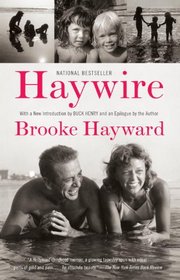Sad, sad, sad.
I thought I could stick with this, however annoying the endless name-dropping and the bone-headed entitlement on show, but the fact is that, however tragic the trajectory of the Hayward children was, their family just isn't that interesting. Just knowing James Stewart, Henry Fonda, and dozens more who are forgotten B-listers of 1930s & 40s Hollywood is not, in itself interesting. Endless accounts of money splurged on a Hollywood/Broadway lifestyle ... not that interesting. The escapades of two adult-babies, who put their own needs and whims above everyone -- a little interesting, but get very old, very fast. All of the above, weighed up against the wreckage of the lives of two of the three Hayward children -- not only not interesting, but downright offensive.
The third Hayward child, Brooke, is the one writing all this, a heartful, heartbreaking testiment to siblings Bridget and Bill, who both killed themselves after lives struggling with mental health issues. She was the eldest daughter of minor film and stage star Margaret Sullavan (no , I had to google it ...) and agent/producer to the stars Leland Harward (who?). Once upon a time, they might both have been fodder for the gossip columns, but that was a long time ago. Brooke's reminiscences are interesting mostly because of the extent to which she's in denial. She has survived the wreckage of her childhood and the demands of her narcissistic parents, but she seems like a victim of Stockholm Syndrome --- insisting that, yes, her brother and sister were damaged when the family "went haywire," but resolutely refusing to see that it happened because her parents were monsters, from a long line of monsters, who treated their children like cute accessories whose needs rated 'way down from Mummy and Daddy Dearest's need for adoration and stimulation. Marriages are blown up because spouses are bored, or (god forbid) left alone for 5 minutes without adoring company of the opposite sex. Children grieving the loss of their family are told everything is much better now because Mummy/Daddy has got what he or she wanted ...
Two stars because it is, on the whole, well-written. And it's sad, sad, sad. But I still couldn't find it in my heart to waste another minute on it.
I thought I could stick with this, however annoying the endless name-dropping and the bone-headed entitlement on show, but the fact is that, however tragic the trajectory of the Hayward children was, their family just isn't that interesting. Just knowing James Stewart, Henry Fonda, and dozens more who are forgotten B-listers of 1930s & 40s Hollywood is not, in itself interesting. Endless accounts of money splurged on a Hollywood/Broadway lifestyle ... not that interesting. The escapades of two adult-babies, who put their own needs and whims above everyone -- a little interesting, but get very old, very fast. All of the above, weighed up against the wreckage of the lives of two of the three Hayward children -- not only not interesting, but downright offensive.
The third Hayward child, Brooke, is the one writing all this, a heartful, heartbreaking testiment to siblings Bridget and Bill, who both killed themselves after lives struggling with mental health issues. She was the eldest daughter of minor film and stage star Margaret Sullavan (no , I had to google it ...) and agent/producer to the stars Leland Harward (who?). Once upon a time, they might both have been fodder for the gossip columns, but that was a long time ago. Brooke's reminiscences are interesting mostly because of the extent to which she's in denial. She has survived the wreckage of her childhood and the demands of her narcissistic parents, but she seems like a victim of Stockholm Syndrome --- insisting that, yes, her brother and sister were damaged when the family "went haywire," but resolutely refusing to see that it happened because her parents were monsters, from a long line of monsters, who treated their children like cute accessories whose needs rated 'way down from Mummy and Daddy Dearest's need for adoration and stimulation. Marriages are blown up because spouses are bored, or (god forbid) left alone for 5 minutes without adoring company of the opposite sex. Children grieving the loss of their family are told everything is much better now because Mummy/Daddy has got what he or she wanted ...
Two stars because it is, on the whole, well-written. And it's sad, sad, sad. But I still couldn't find it in my heart to waste another minute on it.
From the ffp I'm the daughter of a father who's been married five times. Mother killed herself. My sister killed herself. My brother has been in a mental institution. I'm twenty-three and divorced with two kids. Her mother was Margaret Sullavan, the actress with th throaty voice that broke in the high reggisters nd the smile that could break your ehart. Broadway and movie audiences loved her. So did Henry Fonda, William Wyler, Jed Harris, Leland Hayward. but she wanted most of all to be a perfect mother--and she tried too hard.Her father was Leland Hayward, the Toscanini of the telephone who made million-dollar deals for Garbo, Hemingway, Judy garland, Lillian Hellman and who taught Fred Astaire how to dress. Katharine Hepburn called him "the most wonderful man in the world." But he neer quite heard what his children said. Haywire is a Hollywood childhood memoir, a glowing tapestry spun with equal parts of gold and pain. As a book it is an absolute beauty--a Hollywood beauty, to be precise--with all the charm that term implies, the deceptive simplicity, the complex hidden machinery and, above all, the terrible cost." -- Lois Gould, The New York Times Book Review 1977




